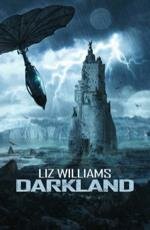

Darkland by Liz Williams
Reviewed by Penny Hill
Tor, London, 2006, 308pp, £10.99, t/p, ISBN 1-4050-4125-0
Ever since Liz Williams' excellent debut novel Ghost Sister, I have been hoping she would someday tell us more stories set on Mondhile, and Darkland fulfils that hope. The reader's realisation that we know this world and some of its rules comes gradually as we read Ruan's story. Our understanding of the background gives a different dynamic to the progress of the novel. We know what Vali is unable to interpret from the notes she finds and we therefore contrast our anxious wait for the up-coming climactic and disruptive festival with Vali's expectation of a tame folk celebration.
The pre-defined rules of this world the inhabitants' links to the energy lines and the real meaning of the bloodmind state form the bedrock for important beats in the narrative.
Although the action centres on Mondhile, Williams' creativity also introduces new worlds for us to explore. The aquatic planet Muspell contains both the Icelandic and feminist influenced society of Skald, and the mystic and misanthropic Vishtie. This world contrasts with the desert planet of Nhem with its overwhelmingly repressive patriarchal regime. I did enjoy the way Williams has set her story far in the future, transposing the richness of our myths such as the selkie from a fantasy setting to her warmly rationalised science-fiction universe.
The split narratives start on separate worlds, however the two threads cohere earlier than expected with our protagonists Vali and Ruan meeting up, giving us a rare chance to see overlapping events from each protagonist's perspective.
It was refreshing to find principal characters that were essentially likeable, even after their character-defining traumas. This is especially impressive when you consider the alienating initial presentation of Vali as an avenging feminist assassin, who uses the experience of being raped as the assassinating weapon.
The depth of the presentation of sexual politics across the four different cultures, would make this novel suitable for consideration for the Tiptree award. There are disturbing and provocative messages here about manipulative and destructive sexual relationships and the power they can exert long after the events are over. The history of Vali's previous damaging relationship with Frey, a Vishtie adept, is gradually revealed to us in flashback. The influence this still has on her psyche permeates the narrative. Her urge to self-harm and the placebo she has found to contain this craving are shown to be coping mechanisms, that hint at the depths of the damage and make it clear that there will be no simplistic healing process available. Likewise Gemaley's sexual power over Ruan reduces him to the status of an addict unable to reject the source of his desire even when he becomes aware of its destructiveness.
Although Darkland is built upon the foundations of Ghost Sister, the narratives are not linked so it can be read independently. Familiarity with Ghost Sister will enable the reader to feel a rewarding additional layer of tension in the narrative. Likewise, this new story is completed in this novel and can be read as a stand-alone work. The epilogue however, opens up new questions and narrative threads, leading us forward to the sequel and whetting our appetites for it.
This is an excellent, well-constructed novel with plenty to offer new readers and existing Williams' fans alike. It has warmth, depth and complexity while remaining fast-paced and enjoyable.
This article first appeared in Vector 247. Back issues of Vector are available from
